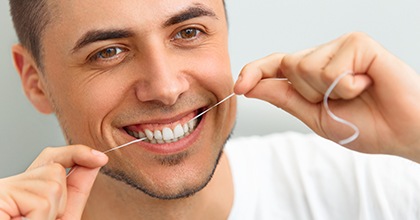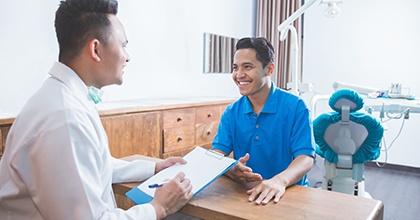Emergency Dentist — Bristol, CT
Fast Relief for Your Dental Emergency

As they say, accidents happen. Unfortunately, sometimes they can happen to your teeth. If you or one of your loved ones suddenly experiences a dental injury, your first call should always be to Bristol Family Dental. We are the best place for you to get the urgent dental care that you need. When you call, our team will immediately spring into action. We’ll make an appointment to see you as soon as possible (even the same day!), and our team will start to walk you through basic first- aid over the phone.
Why Choose Bristol Family Dental for Emergency Dental Care?
- Same-Day Appointments Available
- Flexible Financing Welcome
- One-Visit Restorations Offered
How We Treat Dental Emergencies

When you call us, we’ll ask about your symptoms and provide any necessary first-aid instructions. From there, we’ll schedule an appointment to see you as soon as possible. Upon your arrival, our first priority will be to alleviate any immediate pain, followed by a thorough examination to identify the root of the problem. Once we have a clear understanding of your situation, we’ll discuss your treatment options and associated costs. After agreeing on a treatment plan, we’ll move forward, delivering the prompt care you deserve.
The Most Common Dental Emergencies
Dental emergencies can vary from a severe toothache to a lost tooth. Regardless of the situation, it’s always better to seek treatment promptly rather than adopting a “wait and see” approach. If you're uncertain whether your issue requires immediate attention, we encourage you to reach out to us anyway. We can provide the necessary care the same day! In the meantime, take a look at the information below to learn how to handle some of the most common dental emergencies we encounter.
Understanding the Cost of Dental Emergencies

The cost of emergency dental care can vary widely depending on your unique needs. The price largely depends on the complexity of your condition. For instance, a small cavity requiring just a filling will cost less than a more serious issue, such as an infection that requires an extraction. To get an accurate estimate, schedule an appointment with our emergency dentist. During your visit, we’ll assess your condition, develop a personalized treatment plan, and review the cost along with any available financing options.
How to Prevent Dental Emergencies

While dental emergencies can't be entirely avoided, there are several steps you can take to reduce your risk. Here are some tips to help you maintain a healthy smile:
- Brush your teeth twice a day for at least two minutes each time
- Floss at least once a day
- Wear a mouthguard to protect your teeth during physical activities
- Schedule regular checkups and cleanings with your dentist
Dental Emergency FAQs

More to Explore
Preventive Dentistry Restorative Dentistry Cosmetic Dentistry Dental Technology CEREC One-Visit Restorations Dental Implants View Our Services
